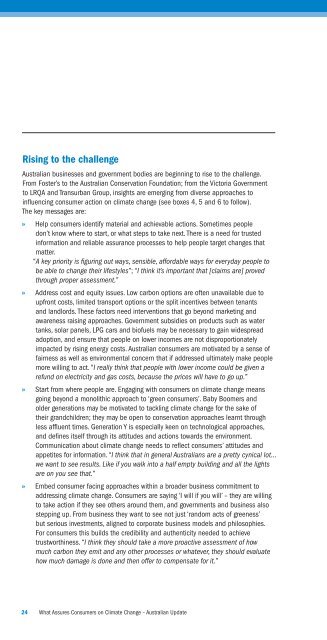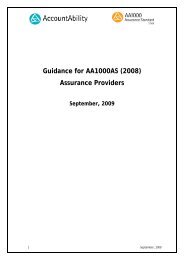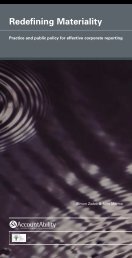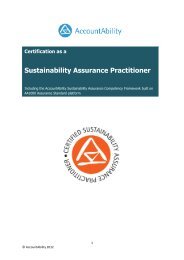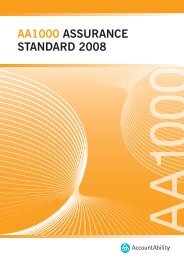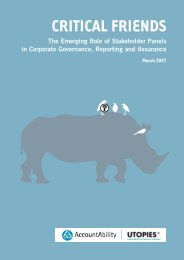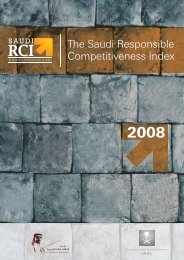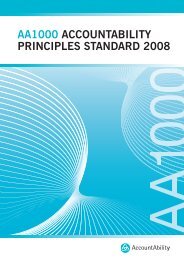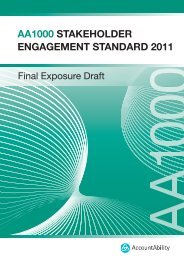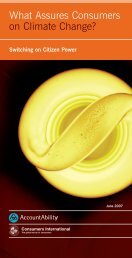Free Download - AccountAbility
Free Download - AccountAbility
Free Download - AccountAbility
- No tags were found...
Create successful ePaper yourself
Turn your PDF publications into a flip-book with our unique Google optimized e-Paper software.
Rising to the challengeAustralian businesses and government bodies are beginning to rise to the challenge.From Foster’s to the Australian Conservation Foundation; from the Victoria Governmentto LRQA and Transurban Group, insights are emerging from diverse approaches toinfl uencing consumer action on climate change (see boxes 4, 5 and 6 to follow).The key messages are:» Help consumers identify material and achievable actions. Sometimes peopledon’t know where to start, or what steps to take next. There is a need for trustedinformation and reliable assurance processes to help people target changes thatmatter.“A key priority is fi guring out ways, sensible, affordable ways for everyday people tobe able to change their lifestyles”; “I think it’s important that [claims are] provedthrough proper assessment.”» Address cost and equity issues. Low carbon options are often unavailable due toupfront costs, limited transport options or the split incentives between tenantsand landlords. These factors need interventions that go beyond marketing andawareness raising approaches. Government subsidies on products such as watertanks, solar panels, LPG cars and biofuels may be necessary to gain widespreadadoption, and ensure that people on lower incomes are not disproportionatelyimpacted by rising energy costs. Australian consumers are motivated by a sense offairness as well as environmental concern that if addressed ultimately make peoplemore willing to act. “I really think that people with lower income could be given arefund on electricity and gas costs, because the prices will have to go up.”» Start from where people are. Engaging with consumers on climate change meansgoing beyond a monolithic approach to ‘green consumers’. Baby Boomers andolder generations may be motivated to tackling climate change for the sake oftheir grandchildren; they may be open to conservation approaches learnt throughless affl uent times. Generation Y is especially keen on technological approaches,and defi nes itself through its attitudes and actions towards the environment.Communication about climate change needs to refl ect consumers’ attitudes andappetites for information. “I think that in general Australians are a pretty cynical lot…we want to see results. Like if you walk into a half empty building and all the lightsare on you see that.”» Embed consumer facing approaches within a broader business commitment toaddressing climate change. Consumers are saying ‘I will if you will’ – they are willingto take action if they see others around them, and governments and business alsostepping up. From business they want to see not just ‘random acts of greeness’but serious investments, aligned to corporate business models and philosophies.For consumers this builds the credibility and authenticity needed to achievetrustworthiness. “I think they should take a more proactive assessment of howmuch carbon they emit and any other processes or whatever, they should evaluatehow much damage is done and then offer to compensate for it.”24 What Assures Consumers on Climate Change – Australian Update


